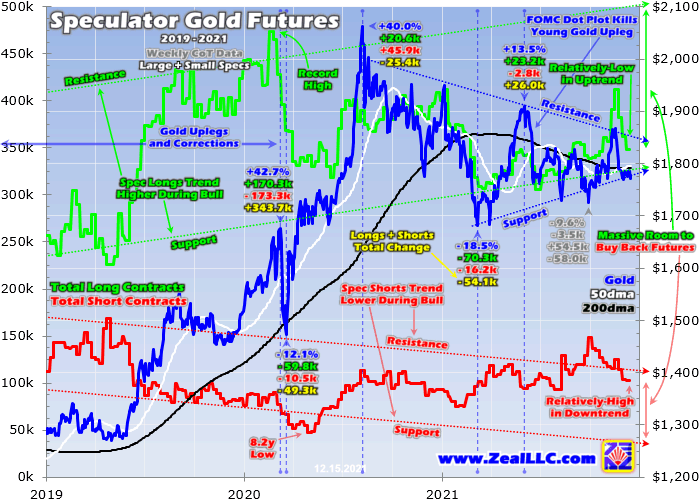Gold weathers hawkish Fed

Gold looked on the ropes heading into this week’s major Fed decision. With the Federal Open Market Committee expected to double the pace of its quantitative-easing tapering and pencil in more rate hikes sooner, gold-futures speculators were on a hair-trigger. The FOMC indeed proved every bit as hawkish as feared, yet gold rallied! Successfully weathering that risky event is very bullish, motivating buyers to return.
Gold has suffered tough sledding over this past half-year, mostly grinding sideways to lower. That lack of sustainable upside momentum left sentiment increasingly-bearish. Investors are indifferent, deserting the yellow metal when there are insufficient upside gains to chase. My essay last week explored this vexing gold investment apathy in depth. When investors’ capital flows dry up, gold is left at the mercy of futures trading.
The gold-futures speculators don’t command much capital compared to investors’ vast pools, but they punch way above their weights on gold-price impact. That’s mostly due to the extreme leverage inherent in gold-futures trading. Specs now only need $7,500 cash in their trading accounts for each contract that controls 100 troy ounces of gold. That’s worth $180,000 at $1,800 gold, making for maximum leverage of 24.0x!
24x is huge absolutely, despite not being notably high relative to gold futures’ history. Specs’ capital firepower is greatly amplified when running near margin limits. Every speculation dollar used to buy or sell gold futures at 24x leverage affects gold prices 24x more than an investment dollar used to buy or sell gold outright! Specs’ outsized gold influence is even greater since gold’s futures price is the world reference one.
So leveraged gold-futures trading bullying gold prices around really affects investors’ psychology. These consummate momentum players are far more likely to migrate capital into gold when it’s being driven higher by gold-futures buying. The opposite is also true, gold-futures selling leaves investors apathetic at best and more likely to pull capital back out of gold. The futures-trading tail wags the far-larger investment dog!
That’s the whole story behind gold’s grinding consolidation since last summer. Periodic bouts of big-to-extreme gold-futures selling flared, briefly hammering gold lower. Those were all driven by specs’ fears of Fed tightening. The crazy leverage they run necessitates an ultra-myopic focus compressing trading time horizons into only hours or days. At 24x, a mere 4.2% adverse move in gold wipes out 100% of capital risked!
To understand why gold’s contrary reaction to this week’s uber-hawkish FOMC is super-bullish, you have to remember gold’s causal chain getting here. This chart superimposes gold’s price action over the last few years on speculators’ positioning in gold-futures long and short contracts. That low-resolution data is disclosed weekly in the Commodity Futures Trading Commission’s famous Commitments of Traders reports.

Speculators and investors alike have a debilitating immediacy bias, weighting recent price action so heavily they soon forget essential longer-term context. This what-have-you-done-for-me-lately shortsighted focus on the present is why gold has been so out of favor recently. It sure shouldn’t be after a pair of mighty bull uplegs peaked in early March 2020 and early August 2020 at huge 42.7% and 40.0% absolute gains!
The latter left gold extremely overbought and ripe for a healthy correction to rebalance sentiment. That unfolded into early March 2021, bottoming at an 18.5% loss. That cleared the decks for gold to resume powering higher again in its next bull upleg. That soon got underway and proved solid, with gold rallying 13.5% by early June. All systems were go for that to grow much larger, but it was derailed by a hawkish Fed.
The FOMC meets eight times per year to adjust monetary policy, about every six weeks. Gold-futures speculators hang on Fed officials’ every word, looking for clues about what’s likely coming. The fortunes of the US dollar are heavily dependent on traders’ outlooks for Fed easing and tightening. Since gold is a competing world currency, it tends to move in lockstep opposition motivating futures speculators to trade in-line.
Gold’s recent woes were spawned by mid-June’s FOMC meeting. Neither that FOMC statement nor the Fed chair in his subsequent press conference hinted at slowing the Fed’s colossal QE money printing or hiking rates, there was no official hawkishness. But quarterly at every other meeting the FOMC releases a supplementary Summary of Economic Projections document, which includes the infamous dot plots.
Those are unofficial individual projections from top Fed officials for federal-funds-rate levels in coming years. The Fed chair himself warned about the dots in his press conference that very day. “They’re not a Committee forecast, they’re not a plan. … the dots are not a great forecaster of future rate moves … dots to be taken with a big grain of salt.” Jerome Powell warned traders to ignore the almost-always-wrong dot plot.
That day merely a third of top Fed officials forecast maybe two quarter-point rate hikes way out into year-end 2023! In market terms that may as well have been an eternity away. But the US Dollar Index surged dramatically on that initial intimation of distant-future rate hikes, unleashing extreme gold-futures selling. Over three trading days starting with the FOMC, gold plunged a brutal 5.2% on a huge 1.9% USDX rally.
CoT reporting weeks for specs’ gold-futures positioning end on Tuesdays. The CoT week straddling that fateful mid-June FOMC meeting saw these traders liquidate an enormous 24.0k long contracts while short selling another 4.9k! Anything over 20k on either the long or short side in any single CoT week is huge. Together that serious puking added up to the equivalent of 89.7 metric tons of gold selling, too much to digest.
The gold-futures specs were solely to blame for that mid-summer gold plunge, investors were actually buyers. As discussed in my gold-investment-apathy essay last week, the best high-resolution proxy for global gold investment demand is the daily holdings changes in the dominant GLD SPDR Gold Shares and IAU iShares Gold Trust gold exchange-traded funds. They actually enjoyed a nice build in that span.
During those same three trading days after mid-June’s hawkish-dots surprise, GLD+IAU holdings climbed 0.6% or 9.2t. Rising holdings reveal gold buying, stock-market capital migrating into the yellow metal. But gold’s sharp plunge back below its critical 200-day-moving-average upleg support unleashed major psychological damage that has festered since. That single event broke the back of mounting gold bullishness.
But gold-futures speculators’ capital is very finite, so major buying or selling quickly exhausts itself. Gold started recovering in July, regaining its 200dma. Yet Fed-hawkishness-driven gold-futures selling soon flared again in early August, on the granddaddy of all market-moving economic reports. The latest US monthly jobs proved better than expected, leaving traders more convinced the Fed would have to soon tighten.
The USDX surged 0.8% over a couple trading days starting on that Jobs Friday, unleashing gold-futures selling intense enough to bludgeon gold 4.1% lower. That included a rare Sunday-evening gold-futures shorting attack. During the CoT week straddling that second summer gold plunge, specs short-sold an epic 35.7k contracts or the equivalent of 110.9t of gold! That was the third-largest CoT week of shorting ever.
But as extreme gold-futures selling is never sustainable, gold quickly recovered and regained all its jobs-report losses by early September. Then another upside surprise in more economic data shook loose yet more gold-futures selling. Mid-month US retail sales beat expectations, likely on rising prices since that data isn’t adjusted for inflation. That left traders more convinced the Fed would have to soon start tightening.
Specs again freaked out, spewing enough gold-futures selling to hammer gold 2.2% lower that day as the USDX surged 0.4%. Investors weren’t shaken, as GLD+IAU holdings enjoyed a slight 0.1% or 1.5t build that day. In the CoT week straddling that third summer gold selloff, specs dumped 21.6k total contracts on both sides of the trade. That added up to the equivalent of 67.2t of gold jettisoned in that short span.
The FOMC was meeting again the following week in late September, and was widely expected to lay out a timeline for starting to slow its colossal money printing from its fourth quantitative-easing campaign. In that very FOMC statement itself, the upcoming QE4 taper was pre-announced. Leveraged gold-futures speculators feared another ugly taper tantrum like back in June 2013 when the QE3 taper was announced.
That original QE taper hadn’t been telegraphed in advance, so it shocked traders at the time. In seven trading days starting with that FOMC meeting, gold collapsed a brutal 12.3%! In a couple essays in mid- and late-September 2021, I argued that gold’s QE4 taper tantrum had largely already happened. Those bouts of extreme gold-futures selling last summer in anticipation of Fed tightening mostly exhausted its potential.
Over the next week or so after that late-September FOMC meeting, gold still swooned a bit further with a 2.8% loss on a 1.3% USDX surge. Specs had dumped another 22.5k gold-futures longs and shorts in that FOMC-straddling CoT week, the equivalent of 70.0t of gold. Investors were starting to worry a little, with GLD+IAU holdings slipping 0.7% or 10.2t in that span. That was still a small fraction of futures selling.
Yet again inherently-limited gold-futures selling soon petered out, so gold rebounded in October. At its next meeting in early November, the FOMC officially launched its QE4 taper. The massive $120b per month of QE4 money printing would be reduced by $15b each month until it was finished. At that pace, QE4’s bond monetizations would finally end by June. That tapering would add on another $420b to QE4’s size.
By the time the dust settled, QE4 would have ballooned to an inconceivably-colossal $5.1t! As of that QE4-taper day, fully 19/20ths of QE4 had happened in just 20.3 months since March 2020’s pandemic-lockdown stock panic. Fed officials had feared its negative wealth effect would spawn a full-blown depression, so they started printing money like there was no tomorrow. The Fed’s balance sheet skyrocketed 106.2%!
The goofy gold-futures speculators should never have assumed QE4 tapering is bearish for gold. Merely slowing the pace of money printing leaves that vast deluge of $5.1t of freshly-conjured US dollars still in the economy. This quickly-doubled money supply competing for and bidding up the prices on far-slower-growing goods and services is the sole reason inflation is raging out of control. Tapering leaves QE4 intact.
That monetary deluge can only be unwound by quantitative tightening, the Fed selling the bonds it bought in QE4 to destroy the trillions of dollars of money wished into existence. QT isn’t even on the table, since it would crash these lofty QE-levitated US stock markets. Maybe gold-futures specs started to realize this after early November’s FOMC meeting, or maybe their selling firepower had simply been exhausted.
Whatever the reason, huge gold-futures buying erupted in the CoT week straddling that formal QE4-taper launch. Relieved that gold didn’t plunge on that news, specs flooded back into longs adding a gargantuan 34.2k contracts. That along with slight short covering added up to the equivalent of 110.8t of gold buying! That helped propel gold 8.2% higher by mid-November, despite Fed officials talking tougher on tightening.
Unfortunately specs’ positioning in gold-futures longs grew overextended, so a rebalancing selloff soon erupted after Biden renominated Jerome Powell for another Fed-chair term. With investors still missing in action, big gold-futures selling hammered the yellow metal lower. Investors don’t return until gold-futures buying drives gold high enough for long enough to convince them upside momentum is back, which hadn’t happened.
Between mid-June and this week, all gold’s significant volatility was fully explainable by gold-futures selling and buying! Huge gold-futures selling had flared on distant-future rate hikes, better-than-expected US economic data, and the QE4-taper pre-announcement. But that reversed to extreme gold-futures buying when the FOMC actually kicked off the QE4 taper. Yet how would gold weather soaring rate-hike odds?
There’s no doubt gold-futures specs were worried heading into this week’s uber-hawkish FOMC meeting. Would some surprise in the FOMC statement, dot plot, or Powell’s post-meeting press conference spark another bout of heavy gold-futures selling? Fears of that left gold relatively-low technically, on the verge of a breakdown this week if more selling erupted. I argued the contrarian side in our weekly newsletter Tuesday.
On FOMC eve this week I pointed out that federal-funds futures were already pricing in plenty of rate hikes next year, so hawkish dots shouldn’t be a surprise. Markets were expecting the first quarter-point hike in May 2022, with better-than-even odds for the second by mid-June. Thus hawkish dots should “prove another big sell-the-rumor-buy-the-news event for gold” like late September’s QE4-taper pre-announcement.
This Wednesday the FOMC indeed doubled the pace of its QE4 taper as expected, ramping that to a $30b-per-month reduction in money printing starting in January. That meant QE4 will be finished a few months earlier in March, paving the way for rate hikes sooner. And the accompanying dot plot was every-bit-as-hawkish as feared. The previous late-September one barely had one rate hike in 2022 and another in 2023.
But the raging-if-not-runaway inflation unleashed by this profligate Fed’s insane QE4 money printing has finally galvanized Fed officials into thinking about acting. So in this week’s new dot plot, their individual projections revealed fully three rate hikes in 2022 then another three following that in 2023! That was one of the most-dramatic pulling forwards of and intensifying a coming rate-hike cycle that has ever been witnessed.
So with a new rate-hike cycle looming larger and faster than almost anyone imagined just a few months ago, gold-futures speculators had every excuse to run for the hills. But they didn’t in the wake of one of the most-hawkish FOMC meetings on record! Whether they expected such a huge jump in coming rate hikes or their selling firepower had already dwindled too much, they stood their ground so gold rallied a bit.
The contrast between gold’s reaction to the mid-June and mid-December FOMC meetings was stunning. Last summer gold plunged 5.2% in several trading days on the dots showing two potential rate hikes way out into year-end 2023. This week gold rallied in the wake of new dots revealing three imminent rate hikes starting next spring with another three following in 2023! Gold’s resiliency in this test is super-bullish.
That implies speculators are mostly done dumping gold futures regardless of what the Fed does. And that sure makes sense. QE4 is now running $4,922b over 26.9 months, of which $4,506b came during the 21.4 months since March 2020’s stock panic. QE tapering leaves that vast monetary excess baked into the system, continuing to bid up prices. Gold has been the ultimate monetary-inflation hedge for millennia.
It’s hard to imagine a more-bullish environment for gold than with a rapidly-more-than-doubled money supply. Gold was averaging about $1,575 in early 2020 before the stock panic, and all the Fed’s crazy money printing since should eventually fuel gold more than doubling in proportion. That would take it up near $3,150, way higher than today’s piddling $1,800. And Fed-rate-hike cycles are no threat to gold either.
The last one ran from December 2015 to December 2018, when the Fed hiked its FFR nine times for 225 basis points total. Eight of those hikes were grouped together in streaks of three and five done at consecutive FOMC meetings, like Fed officials are implying in 2022. During the exact span of that rate-hike cycle, gold rallied 17.0%. During the 11 previous rate-hike cycles since 1971, gold averaged strong 26.9% gains!
So there’s nothing inherently bearish for gold about the Fed raising its federal-funds-rate target. And with QE4 now scheduled to top $5.0t by March when this taper ends, gold should power dramatically higher in coming years on this radically-unprecedented monetary excess. Far more money will remain available to chase and bid up prices on relatively-much-less goods, services, and commodities including gold itself!
Gold successfully weathering this week’s uber-hawkish FOMC meeting showing a major rate-hike cycle looming dead-ahead off the bow is momentous. Gold-futures speculators finally seem to fully expect and accept big Fed tightening coming in 2022 and 2023. Thus they should be less excitable on Fed-hawkish news and economic data going forward. So the secular gold bull their selling delayed should be resuming.
Fundamentally-superior mid-tier and junior gold stocks remain the biggest beneficiaries of much-higher gold prices ahead. They rallied sharply with gold into mid-November, but were dragged back down to their stop losses on this latest bout of heavy gold-futures selling. Our stoppings averaged out to neutral, fully recovering our capital. So we’ve been aggressively redeploying buying back in low in our weekly newsletter.
The bottom line is gold weathered this week’s uber-hawkish FOMC meeting with flying colors. Not only did the Fed double its QE4-tapering pace, but top Fed officials dramatically pulled forward and intensified their rate-hike outlook. A major new hiking cycle now looms dead-ahead, likely to start within months. Yet instead of wilting on this hawkish revelation, gold-futures speculators finally accepted it and resumed buying.
QE tapering isn’t bearish for gold, as it leaves in place the many trillions of dollars of QE money printed. Those directly drive price inflation, competing for far-slower-growing goods and services and bidding up their prices. Gold has also rallied strongly on average through the past dozen Fed-rate-hike cycles since 1971. This next one shouldn’t prove any different, especially in such a super-bullish environment for gold.
(By Adam Hamilton)
{{ commodity.name }}
{{ post.title }}
{{ post.date }}




Comments